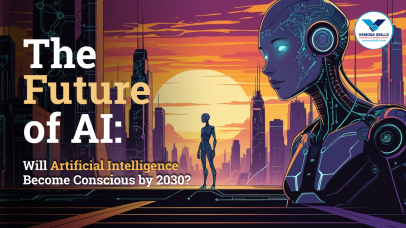The Future of AI: Will Artificial Intelligence Become Conscious by 2030?
In the last 2-3 years, AI has changed so much that it has transformed every industry. It has completely changed the way of work. Every second, a new AI tool is coming and making some work easy and fast. The work that used to take many days or months earlier is now being done in just a few seconds, this is no less than a miracle.
In such a situation, it is justified for a question to arise in our mind that if AI has changed every sector so much in just 2-3 years, then how will the world be in the coming years?
In today's blog, we will not know about the coming 50-60 years, but we will definitely know what AI will be by 2030. Will it become conscious, that is, will it start thinking and working completely like a human, or will there be only a few improvements? What do experts have to say about the transformation of AI, and why is it important for you to understand this evolution if you are using AI to make your work easier and planning to make a career in it, or are passionate about the future of technology? Let’s begin the blog.
Understanding AI Consciousness: What are we really talking about?
Before we move on, let’s clear a big misconception: that current AI is not conscious.
As you know, tools like ChatGPT, DALL.E, and others like them work on algorithms, data, and predefined objectives. They simulate our conversations, recognize patterns in our actions, and predict outcomes – but these tools do not feel, think, or experience like humans.
Consciousness means self-awareness, emotions, experiences, and all those thoughts that are made consciously and independently. And these are all things that are far beyond the capabilities of any machine yet.
So when people ask if AI will be conscious by 2030, they mean:
- Can machines develop self-awareness?
- Can AI models understand why they make decisions, not just how?
- Will AI experience emotions or have a 'sense of self'?
How far are we from conscious AI?
Of course, AI is advancing very fast, but most experts still agree that it is not possible, and even if it is possible, it is a distant dream.
Here's why:
- Current AI is task-oriented: AI today has narrow intelligence, such as playing chess, diagnosing diseases, or analyzing customer data. Consciousness will require general intelligence, or AGI - put differently, the ability to think flexibly and creatively.
- We don't fully understand human consciousness: One of the biggest hurdles is that scientists don't even fully understand how human consciousness works. Without a clear model of consciousness, programming it into machines is like trying to build a spaceship without understanding gravity.
- Technical limitations: Even with powerful hardware and quantum computing, mimicking the subtle neural structures of the human brain is still out of reach.
Experts' opinion
- A leading AI researcher, Dr. Stuart Russell, believes that developing an AI system that is conscious is possible, but it is very difficult to happen in the near future.
- Elon Musk says that AI is becoming very powerful very fast, but it is not such a big threat to us, nor is it becoming conscious; the biggest danger for us is that an uncontrollable intelligence is wrongly associated with the real value of humans. - OpenAI CEO Sam Altman says AI may emerge sooner than many people expect, but real consciousness will require a leap forward, which we're still a long way off from.
Could 2030 be a turning point?
Many forecasters say 2030 could be a watershed year for AI. But mainly in terms of AI integration into society, not consciousness.
Here's what could actually happen by 2030:
- Advanced AGI prototypes: Some companies may be developing rudimentary AGI systems capable of learning and adapting to a wide range of tasks.
- AI copilots everywhere: We'll likely see AI copilots assisting doctors, engineers, marketers, and teachers in deeper, more intuitive ways.
- Ethical and legal debates: As AI systems become more “human-like,” we will face urgent debates about rights, accountability, and the ethical limits of AI.
- AI regulation: Governments around the world will enact more structured AI laws to ensure safe development and deployment.
In short, 2030 will see the emergence of more powerful, adaptable AI — but not truly conscious machines.
Why should you care about AI consciousness?
If you are using AI in your profession, aiming to pursue a career in AI, or are simply passionate about the technology, it is important to understand these developments.
- Career opportunities: Skills such as prompt engineering, AI ethics consulting, and AI governance will increase in demand.
- Adaptation advantages: Those who keep pace with AI advancements will outperform those stuck in old paradigms.
- Responsibility: As AI users and creators, we have a role to play in shaping ethical and responsible AI development.
And the best way to stay ahead? Upskill yourself today.
The Vemosa Skills Academy offers cutting-edge courses in artificial intelligence, machine learning, and AI ethics, designed for future-focused learners.
Whether you’re a beginner or looking to specialize, their practical, industry-aligned programs can prepare you for the AI-driven world of tomorrow.
Myth vs. Reality: Debunking the AI Consciousness Hype
In the world of science fiction, conscious AIs often appear as charming androids or evil robots planning world domination. The reality? Much less dramatic.
Here’s a quick fact-check:
Myth vs. Reality:
Myth: AI will soon develop emotions.
Reality: Emotions are biological responses. AI can mimic them, but cannot feel them.
Myth: Conscious AI is inevitable.
Reality: This is highly uncertain; it may take decades, or it may never happen.
Myth: Conscious AI will be more efficient.
Reality: In fact, emotions and self-awareness can make AI less predictable and efficient!
Myth: AI will replace humans once it becomes conscious.
Reality: Human creativity, empathy, and ethics cannot be fully replicated by machines.
Preparing for the future: What you can do today
Here’s how you can stay smart in AI development:
1. Learn continuously: AI is one of the fastest-growing fields. Courses from platforms like the Vemosa Skills Academy keep you updated with real-world skills.
2. Understand AI ethics: Knowing how to ethically create, use, and regulate AI will become a core skill for AI professionals.
3. Focus on collaboration, not competition: The AI of the future will be tools that enhance human capabilities, not rivals. Build skills that complement AI, such as critical thinking and emotional intelligence.
4. Stay curious: Always ask deep questions – not just how AI works, but why it behaves the way it does. Staying intellectually curious will keep you ahead of the curve.
Final thoughts: Conscious AI by 2030? Maybe not – but the revolution is still coming.
While true conscious AI seems unlikely by 2030, the world will see huge advances in AI’s capabilities, leading to huge changes in how we work, learn, and live.
For tech enthusiasts, professionals, and students, the next five years will be filled with opportunities to innovate, learn, and lead.
And remember, the future of AI isn’t just about machines –
It’s about how humans and AI grow together.
Ready to start your journey into the future of AI?
Discover AI courses at Vemosa Skills Academy and make your career future-ready today!





